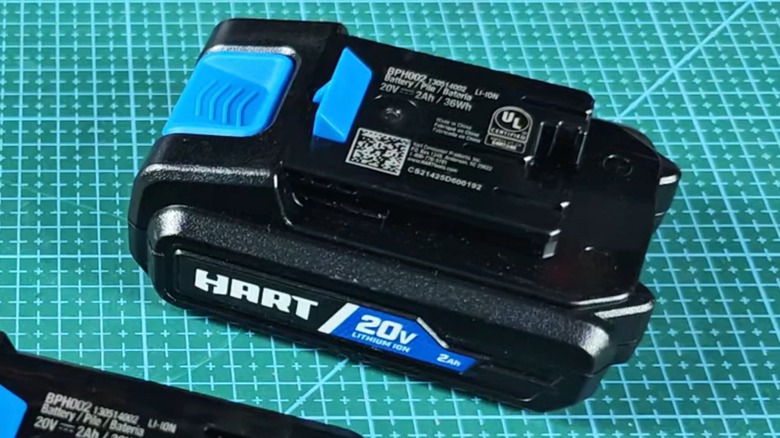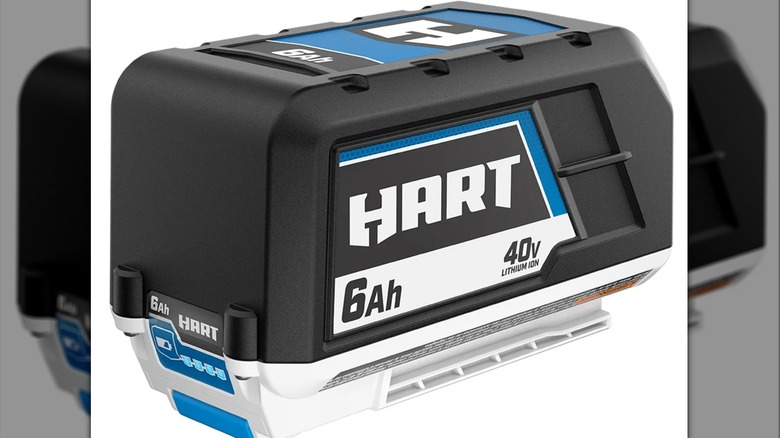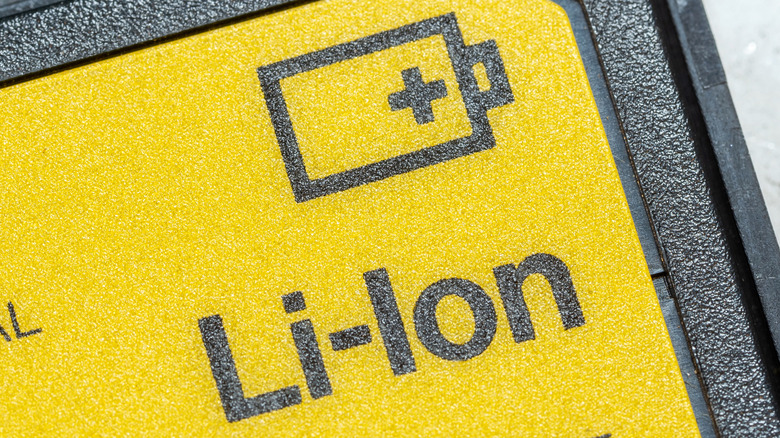Can You Refurbish Or Rebuild Hart Power Tool Batteries?
We may receive a commission on purchases made from links.
While corded power tools haven't necessarily disappeared completely from the marketplace, battery power is the predominant power source in the current era. The majority of tool brands have made the switch, with even smaller budget brands taking it on. This is evidenced by Walmart's exclusive label, and one of the tool brands you may not know is owned by a Chinese company, Hart. It utilizes lithium-ion batteries for its assortment of blue and white tools. Like any other battery brand, Hart's batteries are prone to weakness and failure over time with use, but is there anything you can do once such batteries are on their last legs?
When it comes to refurbishing or rebuilding Hart tools, it's theoretically possible, but such practices are strongly advised against. Lithium-ion batteries aren't intended to be opened up and serviced. In fact, Hart itself urges those with run-down, malfunctioning batteries not to tamper with them. The chemicals within are extremely volatile, and when exposed to the elements, they can become serious hazards. Flammability and even small explosions are likely in a phenomenon known as thermal runaway, which can kick off with even the smallest puncture to a lithium-ion pouch.
Given the danger, opening up and tinkering with a Hart battery to get it working again is out of the question. Thus, to get your Hart batteries powered up, other routes can be explored.
Comparatively safer options to attempted Hart battery revival
There are a couple of alternatives to trying to fix a Hart battery on your own that can get your battery working. One option is to take it to someone who is skilled in fixing lithium-ion batteries in case they can fix it up. At the same time, this isn't an ideal solution. Not only does this put them at risk of the dangers of lithium-ion battery repair, despite their experience, but there's no guarantee they can get the job done. The battery may be too far gone, or their repairs may prove insufficient. At that point, you'll end up paying for battery repairs that don't actually amount to much battery use afterward.
The other option is the clear safe and responsible one: simply purchase a new Hart battery. As noted previously, much of the draw of the Hart tool and battery line is the budget-friendliness of it all. While larger units do get expensive due to their increased power and runtime, on the whole, many of the brand's offerings are a bit cheaper than those from the bigger names out there. For instance, a 20-volt 1.5 Ah Hart battery only costs around $40, while a similar unit at 20V and 1.5 Ah from DeWalt will run you $99. Then again, you may not have to pay if your battery is under Hart's 3-year battery warranty, which covers those that no longer work due to clear factory defect will be repaired or replaced at no charge.
Of course, getting ahold of a new Hart battery is only half the battle. There's also the matter of how to responsibly get rid of your defective one, as improper disposal is one of the biggest problems plaguing lithium-ion batteries.
Proper disposal of bad batteries is even more important than replacement
In terms of global impact, lithium-ion battery disposal is something that must be done right. Such batteries are complex items, filled with volatile chemicals including lithium, nickel, cobalt, a highly-flammable electrolyte and more. Therefore, it's crucial they're kept out of landfills regardless of whether the batteries are in functional shape. Not only can many of these elements be reused, further incentivizing keeping them from harming the natural world, but, as touched on, they're entirely capable of catching fire. Fortunately, if you end up with a stack of non-functioning batteries from Hart or any other brand, you don't have to stockpile them to keep them from hurting the Earth.
One option to getting rid of a Hart battery safely is to consult a company that takes on such efforts. Resources like Call2Recycle, for example, can provide you with a list of various drop-off locations in your area, with many of those typically being hardware stores like Lowe's, Home Depot, and the like. Alternatively, you can do some digging into what types of recycling programs your town itself offers. Some areas have town or city-funded recycling operations that are more than happy to work with you on disposing of your old Hart batteries, along with those from electronics, computers, toys, and more, the right way. No matter where you are, there are better options than tossing your used batteries in the trash.
Lithium-ion tool batteries only last for so long, from Hart or any other brand, so at some point, disposal of old ones and replacement with new ones will have to happen. It's in your best interest to avoid the dangers that come with attempted rebuilding or refurbishing, especially with a cheaper battery line like Hart.


